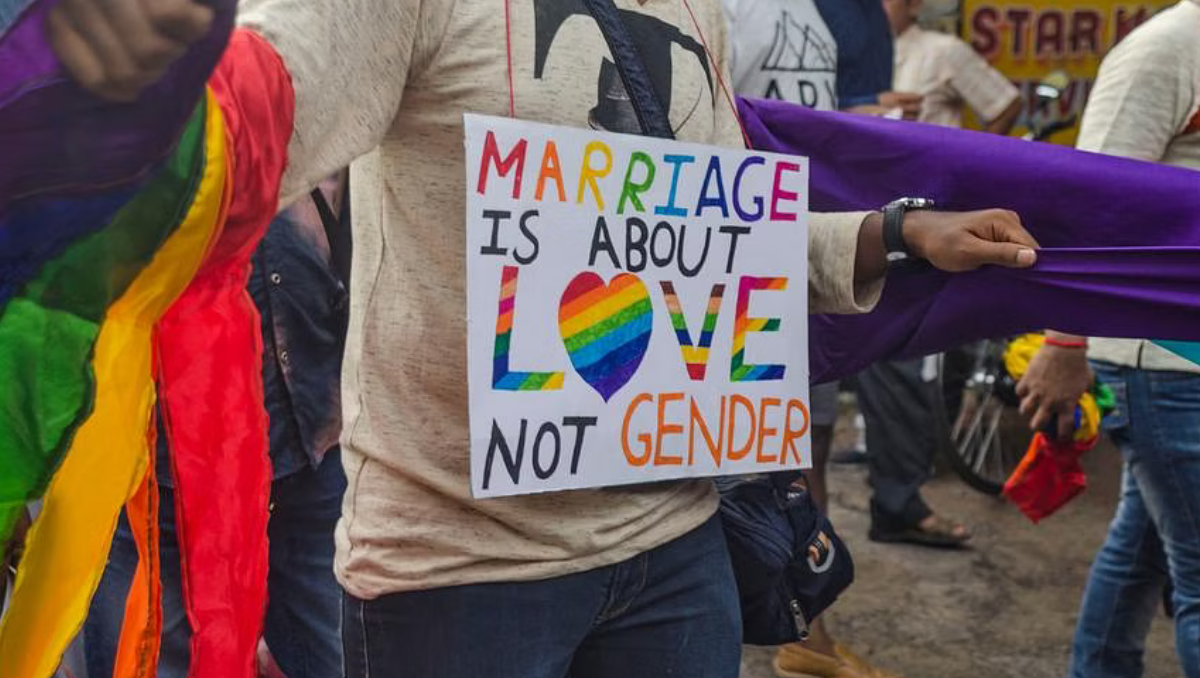India’s Supreme Court declined to legalise same-sex marriage on Tuesday, causing disappointment among numerous LGBTQ+ couples and activists.
In lieu of this, the court has opted to endorse the government’s proposal to establish a committee to assess the possibility of extending additional legal rights and benefits to same-sex couples. Activists and same-sex couples expressed their dismay with the verdict and affirmed their commitment to persist in their advocacy efforts.
Chief Justice DY Chandrachud additionally called upon the government to safeguard the rights of the LGBTQ+ community and put an end to discrimination against them.
This year, a five-judge bench considered 21 petitions aiming to legalise same-sex marriage. On the 17th of October, the bench reached a unanimous decision against the legalisation of same-sex marriage in India.
In another ruling, the bench voted 3:2 against granting legal recognition to civil unions for non-heterosexual couples. It included Justices Sanjay Kishan Kaul, Ravindra Bhat, Hima Kohli, and PS Narasimha.
Verdict against same-sex marriage- details
The court had under consideration 21 petitions submitted by same-sex couples and activists. A five-judge panel conducted comprehensive hearings during the months of April and May, and these proceedings were made accessible to the public via live streaming due to public interest.
The petitioners had proposed a straightforward adjustment to the Special Marriage Act, which permits marriages between individuals of different religions, castes, and nationalities. They suggested substituting “man” and “woman” with “spouse” to encompass same-sex unions.
Conversely, the government and religious leaders vehemently opposed these petitions. The government contended that only the parliament was equipped to address the socio-legal matter of marriage and asserted that legalising same-sex marriage would result in societal “disorder.”
On Tuesday, the judges sided with the government, emphasising that only the parliament had the authority to legislate, while the judiciary’s role remained limited to interpretation. All judges unanimously agreed that LGBTQ+ couples do not exclusively belong to urban or elite demographics, countering a point made by the government during the case’s hearings.
They endorsed Solicitor General Tushar Mehta’s proposition, presented on behalf of the government, to establish a committee led by the nation’s top bureaucrat. This committee’s mandate is to explore the potential for extending the rights and privileges enjoyed by heterosexual couples to LGBTQ+ couples. The bench acknowledged that the difficulties faced by LGBTQ+ couples in accessing essential services were rooted in discrimination and instructed the government panel to address these concerns.
Response of the petitioners and activists-
In India, prevailing attitudes towards sex and sexuality continue to predominantly uphold conservative values, and activists emphasise that the LGBTQ+ community still grapples with social stigma and discrimination.
At the onset of the hearings, there was a sense of India standing at the precipice of history, potentially endorsing same-sex marriages. However, as the hearings unfolded, the complexity of the matter became evident.
The bench acknowledged that the issue was multifaceted, recognising that aspects such as divorce, adoption, succession, maintenance, and various related matters are governed by a multitude of laws, many of which intersect with religious personal laws.
Tuesday’s judgment has left activists and same-sex couples “disappointed”.
During an interview with ANI, Anjali Gopalan, an activist and one of the petitioners, expressed, “We’ve been engaged in this battle for a significant period and remain committed to it. Although the CJI’s remarks on adoption were commendable, it’s disheartening that the other justices didn’t concur. This is a democratic process, but we are denying fundamental rights to our own citizens.”
During the court proceedings, Mukul Rohatgi, a lawyer representing the petitioners, argued that on occasions, society requires a push to acknowledge LGBTQ+ individuals as equals under the constitution. He believed that the top court’s ruling would encourage societal acceptance of the LGBTQ+ community.
However, for India’s LGBTQ+ community, that pivotal moment of acceptance did not materialize on this particular day.
